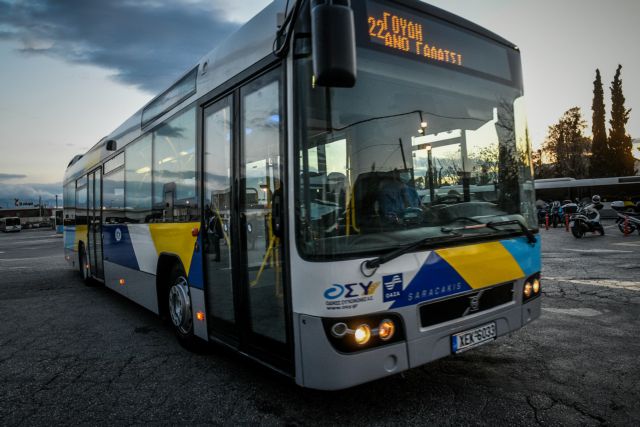
The Tempi train crash brought the issue of transportation safety to the fore. To ensure that no more warnings go under the radar, as happened with the railway, public transport is being put under scrutiny.
Buses are the daily undeniable witness of the obsolescence of the last fifteen years. Old vehicles, frequent breakdowns, worn tires, constant complaints especially in Eastern Attica, where KTEL (Intracity) buses operate, about dirty vehicles with non-functioning doors, broken windows, broken equipment and no telematics system.
And all this, when the debate is raging in Europe about the replacement of conventional heavy vehicles, including city buses, with hydrogen vehicles. The proposal tabled in mid-February for revised CO2 emissions standards calls for zero-emission city buses by 2030.
The economic crisis put road transport on “ice”. The last hirings were made in 2006, while the last new bus joined the fleet in 2009. The average age of diesel buses and trolleybuses is now 19 years, while for thermal buses it is 16. It is the most aging fleet in Europe with vehicles dating back to the 1990s. The first hires were made in 2021 for a total of 609 for the Athens transport operators, while around the same number are expected in the near future.
The general obsolescence also contributed to the limitation of the work produced. It is characteristic that from the 93 million vehicle kilometers and 356 million passengers in 2011, seven years laterMass Transit Use had fallen to 74 million vehicle kilometers and 279 million passengers. Work output was consistently lower than planned, meaning passengers waited at the stop for buses that were late or never came. Drivers decreased, as did the maximum number of scheduled vehicles from 1,464 in 2011 to 1,063 in 2018.
The only solution is new buses
The change of course followed by the last leadership of the Ministry of Infrastructure and Transport, adding vehicles to the fleet through leasing and an agreement with KTEL, dropped the average age. For the 293 buses added through leasing, the average age is 11 years. Thus, obsolete vehicles were taken out of service. Meanwhile, with the renewed agreement, the lines assigned to KTEL increased to 72 from the original 60.
However, no matter how many measures have been taken in the last three years to improve the situation, the result was that almost 1,400 vehicles were decommissioned (among them 850 in the capital) and only the long-awaited supply of 650 new vehicles will substantially change the picture.
The competition, after delays due to rephrasing, redistribution of the mix between electric, natural gas, hybrids and appeals by the companies, has reached the final stretch. The main pending issue is the approval of the Court of Auditors, so that the contracts can be signed. However, given the national elections, as well as the brakes that the national tragedy may have brought, the horizon of the second half of the year looks hazy.
A greener fleet
However, the completion of the first tender, as long as the design is not overturned for whatever reason, will start the preparation for the second phase of procurement which will complete the overall goal of 1,300 new “green” vehicles.
Demands for sustainable mobility and Europe’s ambitious goals for Net Zero and fossil fuel weaning are constantly changing the landscape. Thus the technological mix of the second procurement will be re-evaluated. It is characteristic that the 100 hybrid buses that were foreseen in the first part of the current tender, but were ultimately left out of investment interest, will not pass to the next tender and will be replaced by greener technologies.
However, the existing procurement model is considered extremely problematic. Essentially, it “pushes” the necessary renewal of the urban transport fleet to a 15-year horizon, with the result that the average age of the vehicles will skyrocket. To avoid this, market sources estimate that an acceptable shorter procurement cycle is three to four years, so that the domestic market is also sustainable.
Latest News

German Ambassador to Greece Talks Ukraine, Rise of Far Right & Tariffs at Delphi Economic Forum X
Commenting on the political developments in his country, the German Ambassador stressed that it was clear the rapid formation of a new government was imperative, as the expectations across Europe showed.

Athens to Return Confiscated License Plates Ahead of Easter Holiday
Cases involving court orders will also be excluded from this measure.

Servicers: How More Properties Could Enter the Greek Market
Buying or renting a home is out of reach for many in Greece. Servicers propose faster processes and incentives to boost property supply and ease the housing crisis.

Greek Easter 2025: Price Hikes on Lamb, Eggs & Sweets
According to the Greek Consumers’ Institute, hosting an Easter dinner for eight now costs approximately €361.95 — an increase of €11 compared to 2024.

FM Gerapetritis Calls for Unified EU Response to Global Crises at EU Council
"Europe is navigating through unprecedented crises — wars, humanitarian disasters, climate emergencies," he stated.

Holy Week Store Hours in Greece
Retail stores across Greece are now operating on extended holiday hours for Holy Week, following their Sunday opening on April 13. The move aims to accommodate consumers ahead of Easter, but merchants remain cautious amid sluggish market activity.

Green Getaway Ideas for Easter 2025 in Greece
Celebrate Easter 2025 in Greece the sustainable way with eco-farms, car-free islands, and family-friendly getaways rooted in nature and tradition.

Civil Protection Minister Details Summer Firefighting Plans at Delphi Forum
At the 10th Delphi Economic Forum, Minister of Climate Crisis and Civil Protection Yiannis Kefalogiannis discussed Greece's plans for the upcoming fire season.

How Shops and Markets Will Operate During Easter Holy Week
The Easter holiday schedule has been in effect since April 10, with retail stores open Palm Sunday, and most supermarkets also operating to meet consumer demand for Easter shopping

Why Is the French Aircraft Carrier Charles De Gaulle in Piraeus?
Docking in Piraeus after a four-month deployment in the Indo-Pacific region, the admiral of the aircraft carrier the Charles de Gaulle says, "Greece is our best partner in the Mediterranean."








































 Αριθμός Πιστοποίησης
Αριθμός Πιστοποίησης